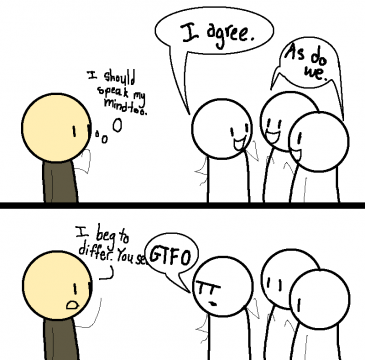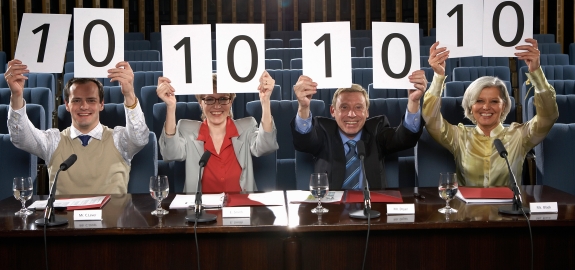
Whenever a video game score lines up with the public’s expectations, all is well in the world of a game reviewer. If a game looks like complete crap and gets a score to reflect that, or if a game looks amazing and gets a terrific score, then readers will be happy. However, what happens when a score doesn’t align with the general population’s expectations? Well, naturally, the Internet goes crazy!
I’ve written about this issue two years ago, and it doesn’t seem like much has changed since then. The latest game that is following this trend is The Legend of Zelda: A Link Between Worlds, which was universally praised by every media outlet except Destructoid, which gave it a slightly above average review. The end result is an article over 2,000 comments, filled with angry, uncivil debate about how the score is complete crap or a so-called cry for attention. Even though this review was put out before the general public had access to the game itself, users were claiming to know more than the reviewer and bashed his opinion as untrustworthy. This is something I cannot fully comprehend. If you already want to purchase a game and have a complete lack of trust in critics, then why bother reading a review? I can understand if someone wanted to read multiple reviews from critics to aid in game purchases, but some fans are seeking regurgitation of their own preset views and can’t handle a difference of an opinion.

So, what does this have to do with review scores? Well, these kinds of readers are pointing all of their frustrations at the score itself. Apparently, if a game is well-liked or highly anticipated, then no one is allowed to give a low score, since every opinion must somehow be completely uniform and devoid of individual thought. The opposite can prove to be true as well, as a universally bashed game with a high score can attract negative attention too. But, perhaps one of the biggest catalysts lies within the Metacritic score of a game. Metacritic is an aggregate site that brings a bunch of reviews together to give an average score to a specific game. Nintendojo supports Metacritic’s system and allows our scores to be posted on the site, and I personally love using it to assist my own gaming purchases. Unfortunately, because the aggregate score could symbolize how well-liked a game is to the public, some people can take it way too seriously. If a reviewer doesn’t meld with other critics’ scores, then the Metacritic score fluctuates, leading fans to violently lash out at the reviewer in question.
Of course, it’s easy to blame the scoring system in these situations, and I’ve seen many calls for change within critic reviews as a result. Some people are quick to blame reviews for not being objective, claiming that objective reviews would give more credibility to review scores. Yet I don’t think those people realize the magnitude of what they are saying. Writing an objective review is impossible because the entirety of a review is all about an opinion of a reviewer. Since there is no such thing as an objectively good or bad game, a reviewer must use his opinion to tell the public his or her honest thoughts about a game. This is what a good review is all about! If you read reviews just to receive positive validation of your own opinion, then you’re better off just reading press releases.

However, probably the biggest call for change involves getting rid of review scores altogether. This prevailing theory claims that we can stop rabid fans from complaining about reviews if we remove the scores, which will lead to the community engaging in debate about a game’s merits and faults instead. However, I can’t say I particularly agree with this notion either. Yes, you will eliminate discussion about the score as well as pointless scoring comparisons, but the intensity of the reactions will not change. You might stop people from wondering why games like A Link Between Worlds never reached higher than a 6.5 on Destructoid, but the text would still reflect the same thoughts of the score and thus cause the same amount of angst in the community. I’ve heard that people sometimes just look at a score of a review and don’t read the text, but if review scores are gone, are these people really going to ignore reviews? I seriously doubt it.
In reality, a lack of review scores would only substantially effect Metacritic. The idea of removing scores to appease angry fans who care about the Metacritic average is meaningless to me because these readers would be angry at non-uniform reviews regardless. However, my interest does get piqued when people talk about removing scores because they harm developers. This argument actually has a legitimate basis, as developers in this industry sometimes receive hefty bonuses if they achieve a high score on Metacritic. Also, indie developers can have it even worse, as they may have to buy a review for their own game depending on the publication. Not only are both of these awful business practices, but the latter could effectively encourage biased review scores!

I can understand where people are coming from on this side of the argument, but the review scores are still not at fault for these issues. In this situation, I have to wag my finger at the gaming industry instead because they are the ones abusing a good system in ridiculous ways. I absolutely love review scores, and I enjoy summarizing my thoughts with Nintendojo’s rating scale. But, it pains me to think that my score may directly influence the bonuses of developers because all I’m trying to do is tell people my honest opinion about video games. It’s also equally disturbing to think about these paid reviews, but we have to come to terms with the fact that getting rid of review scores will not solve this problem. If we got rid of review scores, we would probably be dealing with some other version of these practices morphed to accommodate general text reviews. We must criticize the people utilizing the scores in horrible ways, as opposed to criticizing the scores themselves, in order to see a positive result in the gaming industry.
We rate and review tons of different things on the Internet all the time, so why do video games need to be the exception? I truly believe that there is nothing inherently wrong with scoring a game, and I think it garners a lot of unnecessary negative attention. What do you think about review scores? Let us know in the comments below!




 ShareThis
ShareThis







I like to read reviews, and I admit I enjoy seeing scores I agree with, but I’m much more interested in what a review has to say about the content of a game.
Several less-than-positive reviews of Sonic: Lost World actually led me to buy the game. The things the reviewers complained about actually sounded really fun to me. Sure enough, the game is very fun – for me.
And that’s the point. I fully acknowledge that “fun for me” different from “fun for you”. Many reviews gush about God of War and Lego games, but both series are incredibly dull for me. FreakyForms got some pretty awful reviews, and it’s one of my favorite 3DS games.
I’ve released some small apps and games for tablets and phones, and I’m convinced that for everything that exists in this world, someone will think it’s the greatest thing ever, and someone else will hate it more than all the evils of the world combined. Each person’s opinion is interesting, and gives their individual score/rating context. Where it goes wrong is when these scores inevitably get averaged. When that happens, all the meaning is lost.
I agree with a lot of what you said. Hell, I’m buying Sonic: Lost World myself, and I’ve definitely enjoyed plenty of games that most people wouldn’t consider fun at all. It’s all within the eye of the beholder!
There will never be an objectively good or bad game that everyone likes or dislikes, so I take what reviews say with a grain of salt. In regards to reviews, I match up what the author liked and disliked with my own gaming tastes to figure out if its meant for me or not. Take Fortune Street, a Mario and Dragon Quest crossover party game about the stock market, for example. Fortune Street is a game that most reviewers tended to dislike because it was heavily based on menus, didn’t feature interactive gameplay like Mario Party’s minigames, and can take hours to finish a single match. Yet, these criticisms didn’t come across as problems to me and even enticed me, leading me to fall in love with its slow yet deep strategy-based gameplay. This is a perfect example of how a publicly deemed good or bad game will never have a completely universal opinion and how reading the content of a review positively effects consumer’s purchases.
I like to see the average because I enjoy seeing the general consensus of a game. This is just a personal preference of mine, as the average piques my curiosity about a game even further and encourages me to read more in-depth by looking at each review. I can definitely see why you think the average is arbitrary though :)
I can see the appeal of a “consensus” kind of statistic. And if that’s a helpful (or just interesting) ingredient in deciding whether to try or buy a game, then I wouldn’t want to take that away from anyone.
Many of my favorite games are quirky or have personality such that opinions will vary wildly depending on tastes. So for me personally, averages are useless. There’s no distinction between “everyone is ‘meh’ about this” and “some love it and some hate it”.
What might be interesting is to co-write reviews. Find two people with differing views about a game and, maybe not debate exactly, but try to put their fingers on _why_ they feel differently about it. They might even come up with a compromise score and some modifiers. +1 letter grade for Code of Princess if you have fond memories of Guardian Heroes. -2 letter grades for God of War if you hate simon-says gameplay sequences.
My main issue with review scores that seem a little off is when the reviewer is basing their opinion off of something that doesn’t have any business informing their score. For instance, when Ace Attorney came out for 3DS, one reviewer on a prominent gaming site listed a lack of gameplay as a complaint about the game. That just made no sense to me, as the reading is part of the gameplay in an Ace Attorney title. It’s a take on the visual novel genre of video games, and if the reviewer doesn’t know that/doesn’t care, it means unfair criticisms are levied against it. It was like someone reviewing Mario Kart and saying it sucks because there’s so much racing.
Oh, one more thing, I totally agree with the thing about review scores. I always think it’s funny when people try to argue the use of a ten point scale versus a letter score versus a pass/fail, as the end result falls across the universal spectrum of “it sucks/it doesn’t suck”. Whether someone labels a game with an F, 5.0, or just stamps it with a Fail, they all ultimately mean the exact same thing! I guess one system might seem fairer, offer a wider array of evaluations, or just look better to some people, but it really doesn’t make a difference in the end. As you said, the words in the review itself are what is most important.
Lots of good points hit in this article.
I have no problem with review scores, with a few small caveats. They represent a useful simplification that helps many people get a feel for how much other people are enjoying a game.
So what are the caveats? What do I not like about review scores?
* having Metacritic non-sense tied into performance bonuses
* people who confuse a simplification of an opinion with an objective value
* anonymity: since reviews are just opinion pieces, it’s nice to clearly identify who the reviewers are and make it easy to see their other reviews – help me get a better idea of whether their tastes align with mine